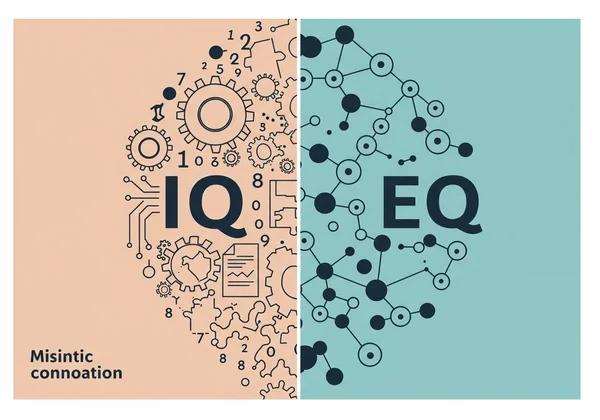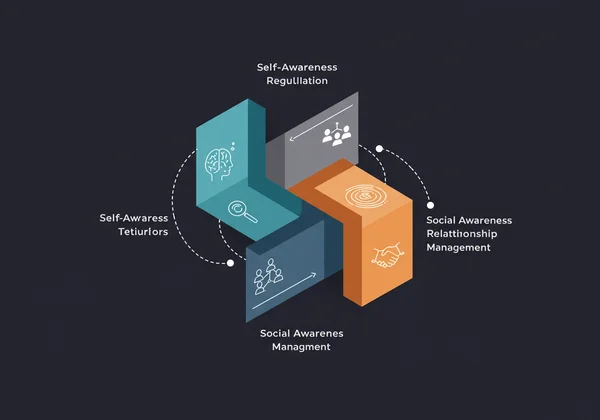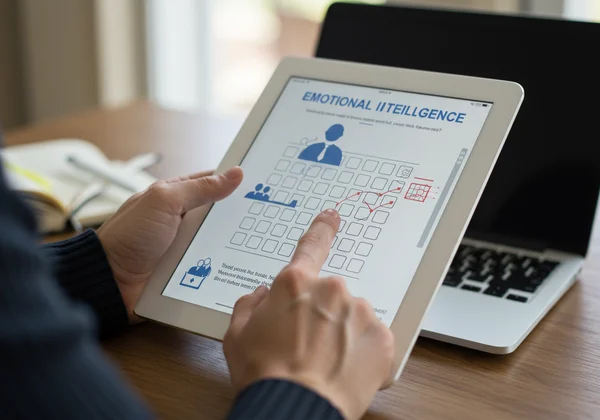Emotional Intelligence (EQ) Explained: Take Your EI Test Today
August 26, 2025 | By Evelyn Reed
Unlocking Your Inner Compass: Why Emotions Are Your Superpower
Have you ever wondered why some people navigate life’s challenges with grace, build strong relationships effortlessly, and seem to make sound decisions under pressure? The answer often lies not in their intellect (IQ), but in their Emotional Intelligence (EQ). This guide will explore what emotional intelligence is, why it's a critical skill for success in every area of your life, and how you can begin to understand your own. What is the EI test? It's your first step toward unlocking this inner superpower. By understanding your emotional landscape, you can start a journey of profound personal growth. Ready to begin? You can discover your EI today.
What Exactly Is Emotional Intelligence (EQ)?
Emotional Intelligence, often referred to as EQ, is the ability to perceive, understand, manage, and use emotions to facilitate thinking and navigate social situations effectively. It's the capacity to recognize your own feelings and those of others, to motivate yourself, and to manage emotions well in yourself and in your relationships. Think of it as the intelligent use of emotions: you intentionally make your emotions work for you by using them to help guide your behavior and thinking in ways that enhance your results.
Beyond Book Smarts: Distinguishing EQ from IQ
For decades, IQ was seen as the primary determinant of success. However, research and real-world experience have shown that IQ alone is not enough. While IQ represents your cognitive abilities—like learning, reasoning, and problem-solving—EQ governs your ability to connect with others and manage your inner world. Someone with a high IQ might solve a complex algorithm but struggle to handle feedback or work in a team. A person with high EQ, on the other hand, can navigate workplace politics, inspire colleagues, and resolve conflicts with empathy. An EI assessment helps measure these crucial interpersonal skills.

A Brief History: From Concept to Cornerstone
While the concept of social intelligence has been around for much longer, the term "emotional intelligence" was popularized by psychologist and science journalist Daniel Goleman in his 1995 book, Emotional Intelligence. Goleman argued that EQ was a more powerful predictor of success in life than IQ. This idea revolutionized fields from business leadership to education, establishing EI as a cornerstone of personal and professional development. Today, understanding your emotional intelligence score is considered a key part of self-awareness.
Why EQ Isn't Just About Being "Nice"
A common misconception is that high emotional intelligence simply means being polite or suppressing your emotions. This couldn't be further from the truth. EQ is about being aware of your emotions, not ignoring them. It involves expressing your feelings appropriately and productively, setting boundaries, and holding difficult conversations when necessary. It's the difference between bottling up frustration until you explode and calmly explaining to a colleague why their actions are impacting your work. True emotional intelligence is about honesty, not just niceness.
The 4 Pillars of Emotional Intelligence: Goleman's Model
Daniel Goleman outlined a framework of four key components that make up emotional intelligence. Understanding these pillars helps break down this complex skill into manageable parts that you can actively develop. This model provides a clear roadmap for anyone looking to improve their EQ.

Self-Awareness: Knowing Your Inner Landscape
Self-awareness is the foundation of emotional intelligence. It is your ability to accurately recognize your own emotions, strengths, weaknesses, values, and drives, and understand their impact on others. Someone with strong self-awareness knows how their feelings affect them and their job performance. For instance, they recognize that tight deadlines make them feel anxious, so they proactively manage their time to avoid last-minute stress. They are honest with themselves about where they need to improve.
Self-Regulation: Mastering Your Emotional Responses
Building on self-awareness, self-regulation is the ability to control or redirect disruptive impulses and moods. It's about thinking before you act. Instead of lashing out when you're angry, you can take a moment to understand the source of your anger and choose a more constructive response. This skill is crucial for building trust and reliability. A manager who practices self-regulation remains calm under pressure, creating a stable and reassuring environment for their team.
Social Awareness: Understanding Others' Emotions
Social awareness is the ability to understand the emotional makeup of other people. At its core, it is empathy—the skill of sensing others' feelings and perspectives and taking an active interest in their concerns. This doesn't mean you have to agree with them, but simply that you can see things from their point of view. A socially aware professional can read the mood of a room during a meeting, understand unspoken dynamics, and tailor their message to resonate with the audience.
Relationship Management: Building Strong Connections
The final pillar, relationship management, is about using your awareness of your own emotions and those of others to manage relationships successfully. This involves clear communication, inspiring and influencing others, working well in a team, and managing conflict. It's the culmination of the other three pillars. A leader with strong relationship management skills can build rapport, articulate a compelling vision, and guide their team through change with compassion and effectiveness. Find out where you stand by taking a free ei test.
Why Does Emotional Intelligence Matter So Much?
Understanding the definition and components of EI is one thing, but recognizing its profound impact is what truly inspires change. Emotional intelligence isn't a "soft skill"; it's a fundamental life skill that directly influences your happiness, relationships, and success. Investing in your EQ is investing in a better version of yourself.
Boosting Your Personal Life: Relationships & Well-being
In your personal life, high EQ allows you to build deeper, more meaningful connections. By understanding your own emotions and empathizing with others, you can communicate more effectively, resolve conflicts constructively, and provide better support to friends and family. This leads to healthier and more fulfilling relationships. Furthermore, skills like self-regulation are essential for managing stress and maintaining mental well-being, helping you navigate life's inevitable ups and downs with greater resilience.
Excelling in Your Professional Life: Career & Leadership
In the workplace, emotional intelligence is a game-changer. Employees with high EQ are better collaborators, more adaptable to change, and more receptive to feedback. For leaders, it is arguably the most critical attribute. An emotionally intelligent leader can motivate their team, foster a positive work environment, and drive engagement and performance. Many companies now use an ei test for leaders during the hiring and promotion process because they recognize that technical skills alone do not make a great leader.

EI as a Learnable Skill: Your Path to Growth
Perhaps the most empowering truth about emotional intelligence is that it is not a fixed trait. Unlike IQ, which remains relatively stable throughout life, EQ is a flexible set of skills that can be learned and improved with practice. By identifying your areas for development—which is the first step an online ei test can help you with—you can actively work on enhancing your self-awareness, managing your reactions, and improving your social skills. Your journey to emotional mastery can begin today.

Ready to Start Your Emotional Mastery Journey?
We've explored what emotional intelligence is, deconstructed its four essential pillars, and highlighted why it is so critical for a successful and fulfilling life. From strengthening personal relationships to accelerating your career, the benefits of a higher EQ are undeniable. The most important takeaway is that this is not a fixed trait but a skill you can cultivate.
The journey begins with self-awareness—understanding your current emotional strengths and areas for growth. An objective, scientifically-backed assessment is the most effective way to gain this clarity. Don't leave your personal development to guesswork. Are you ready to unlock your potential? Take our free EI test today and receive immediate insights to start your path toward emotional mastery.
Frequently Asked Questions About Emotional Intelligence
What is the EI test?
An EI test is an assessment designed to measure various aspects of your emotional intelligence. It typically presents you with a series of questions or scenarios to evaluate your self-awareness, self-regulation, social awareness, and relationship management skills. The results provide a snapshot of your emotional strengths and weaknesses, offering a starting point for personal development.
What are the 4 pillars of emotional intelligence?
The 4 pillars of emotional intelligence, as popularized by Daniel Goleman, are:
- Self-Awareness: Recognizing and understanding your own emotions.
- Self-Regulation: Managing your emotions and impulses effectively.
- Social Awareness: Perceiving and empathizing with others' emotions.
- Relationship Management: Building and maintaining healthy relationships.
How do I know if I have high EQ?
Signs of high EQ include being able to manage your emotions in stressful situations, accurately reading social cues, listening actively, accepting constructive criticism, and showing empathy for others. While self-reflection is helpful, the most objective way to understand your EQ is by taking a structured assessment. An eq test can provide a detailed analysis of your abilities across different domains.
How can an EI test help my career?
An EI test can significantly benefit your career by providing clear insights into your soft skills, which are highly valued by employers. By understanding your ei test results, you can identify areas for improvement, such as communication, leadership, or teamwork. This self-knowledge empowers you to seek targeted training, become a more effective leader, and navigate workplace dynamics with greater confidence, ultimately leading to better performance and career advancement.
How to improve emotional intelligence?
Improving emotional intelligence is an ongoing process that starts with self-awareness. Begin by paying attention to your emotions throughout the day and how they influence your actions. Practice active listening in conversations, try to see situations from others' perspectives, and learn techniques for managing stress, like mindfulness or deep breathing. Taking an online EI test is a great first step to get personalized insights and actionable advice for your growth.